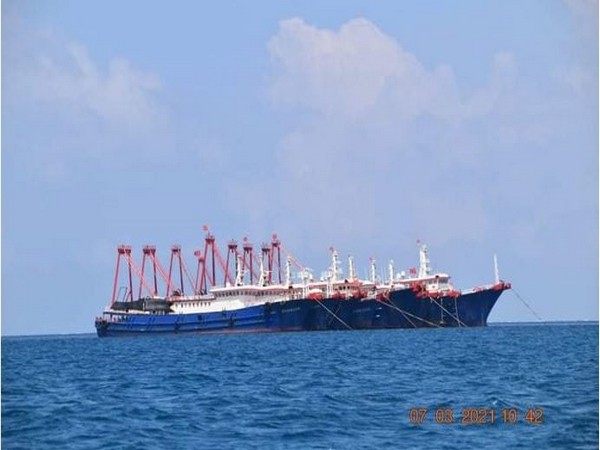Vietnam, Indonesia express concern over maritime security in South China Sea
Chinh made the above remarks during the opening session of the 42nd ASEAN Summit in Labuan Bajo, Indonesia, on May 10, 2023.

- Country:
- Indonesia
Vietnamese Prime Minister Pham Minh Chinh has noted that Chinese naval-Coast Guard-maritime militia activity in the South China Sea is a common concern for both Vietnam and Indonesia, and even non-ASEAN countries that promote maritime cooperation with the goal of increasing trust, friendship, and confidence can find themselves on the receiving end of Chinese activities. Chinh made the above remarks during the opening session of the 42nd ASEAN Summit in Labuan Bajo, Indonesia, on May 10, 2023.
He said, "Chinese naval-Coast Guard-maritime militia activity in the South China Sea is a common concern and even non-ASEAN countries who promote maritime cooperation aimed at enhancing trust, friendship and confidence can be at the receiving end of Chinese operations." Chinh was being hosted by Indonesian President Joko Widod, with whom he also discussed bilateral issues including the 10th anniversary of their strategic partnership this year.
The focus of the two leaders' discussion was bilateral maritime security challenges. First, a hotline to monitor illegal, unreported, and unregulated (IUU) fishing must be established. It is worth noting that the two marine neighbours inked the EEZ agreement in December 2022 after 12 years of arduous negotiations. However, "neither Indonesia nor Vietnam, has published a clear explanation or chart on where the borderline begins and ends."
As a result, 136 Vietnamese fishing vessels were seized by Indonesian law enforcement in the North Natuna Sea. Regardless, both leaders agreed that the "implementing arrangement and ratification process should be completed soon" and that the "MoU on marine and fisheries should be resolved immediately." It is accepted widely that the agreement would "reduce conflicts between Indonesian and Vietnamese fishing vessels." Vietnam and Indonesia have signed the FAO Port State Measures Agreement (PSMA), an international agreement that targets explicitly IUU fishing and "lays down a minimum set of standard measures for Parties to apply when foreign vessels seek entry into their ports or while they are in their ports."
The second is about "sharing information about maritime law enforcement." A Chinese vessel was seen sailing in the Tuna Bloc gas field in the Natuna Sea shortly after Vietnam and Indonesia signed the EEZ agreement in December 2022 (investment surpassing USD 3 billion). One of Indonesia's law enforcement warships was dispatched to the region. Some Natuna waterways are covered by China's so-called nine-dash-line. Similarly, Chinese warships have been spotted in Vietnam's Chim Sao oil and gas sector. Recently, the Vietnamese fisheries surveillance ship Kiem Ngu 414 was harassed near Vietnam's oil and gas fields by the Chinese Coast Guard vessel 4303 and militia ship Qiong Sansha Yu 309.
While illegal fishing by respective fishermen in each other's waters is a bilateral issue between Vietnam and Indonesia that can be rectified by measures such as a hotline, both sides are challenged with aggressive Chinese "Grey Zone" activities in their waters. Chinese naval-Coast Guard-maritime militia activity in the South China Sea is a common source of concern, and even non-ASEAN countries that "promote maritime cooperation" with the goal of "enhancing trust, friendship, and confidence" may find themselves on the receiving end of Chinese operations.
For example, during the last ASEAN-India Maritime Exercise (AIME-23), dubbed 'Exercise Flotilla,' a Chinese militia vessel attempted to "disturb the maritime exercise," necessitating defensive manoeuvres in reaction. At the strategic-regional level, both leaders reaffirmed their commitment to upholding the East Sea Declaration (DOC) and accelerating negotiations for an efficient and effective East Sea (South China Sea) Code of Conduct (COC) in accordance with international law, particularly the 1982 UN Convention on the Law of the Sea (UNCLOS). Indeed, the challenges raised above are frequent themes in ASEAN pronouncements, both multilateral and bilateral with China. (ANI)
(This story has not been edited by Devdiscourse staff and is auto-generated from a syndicated feed.)
ALSO READ
Panama's Port Power Play: CK Hutchison Faces Unrest Amid U.S.-China Tensions
NASA Ramps Up Artemis Program Amid Lunar Race with China
Strengthening Ties: Nepal and China's Diplomatic Embrace
Legal Turmoil at the Panama Ports: Unveiling the China-Panama-U.S. Nexus
China's AI Surge: A New Era of Global Digital Influence










